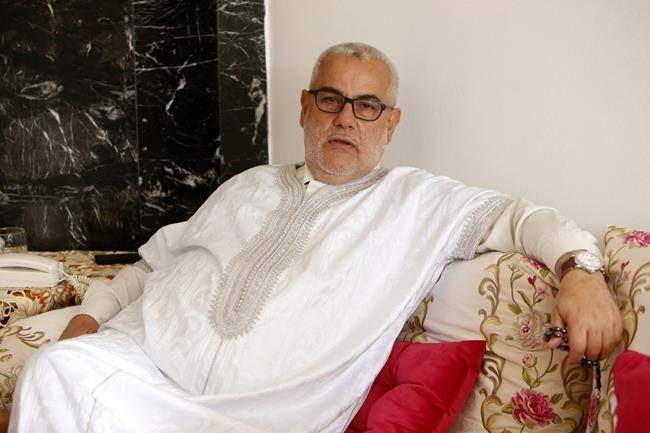
Moroccan Prime Minister and leader of the Islamist Justice and Development Party, known as the PJD, Abdelilah Benkirane speaks about the upcoming nationwide legislative election, during an interview with The Associated Press at his home in Rabat, Monday, October 3, 2016. Voting booths open on Oct. 7 for the North African kingdom's parliamentary elections, in which 395 seats in the upper house of Parliament are up for grabs. (AP Photo/Abdeljalil Bounhar)
Republished October 03, 2016 - 9:53 AM
Original Publication Date October 03, 2016 - 8:15 AM
RABAT, Morocco - Morocco's prime minister is calling his main political rival in this week's elections a "liar" for claiming that state-funded associations are behind growing Islamic extremism among Moroccan youth.
In a sweeping interview Monday with The Associated Press, Prime Minister Abdelilah Benkirane acknowledged the challenges of stopping radicalization and balancing the budget, and called for greater attention to women's issues.
Benkirane defended the record of his moderate Islamist Party of Justice and Development, which faces a tough challenge in Friday's parliamentary elections from the Party of Authenticity and Modernity, seen by many as close to the royal palace.
Benkirane denied accusations from his main political rival, PAM secretary general Ilyas El-Omari, that state-funded and -accredited associations are behind the radicalization of young people.
"Can he name these associations?" Benkirane asked.
El-Omari, speaking to the AP on Saturday, called for investigations into the funding behind those associations, and pledged to use cultural programs, education and jobs as weapons to fight extremism if his party wins Friday's election.
The prime minister said he does not consider PAM a political party, describing the current political opposition as "manipulated" by unspecified forces. PAM does not have a clear ideological bent, but describes itself as "democratic and modern."
For the prime minister, fighting extremist violence requires a two-pronged approach. While security is absolutely necessary, he said, there also needs to be greater encouragement of moderates who demonstrate a more "tolerant and enlightened" understanding of Islam. He didn't elaborate.
Under the mandate of the PJD-led government, Moroccan authorities have dismantled more than 30 cells — including one broken up Monday comprised entirely of women with alleged ties to the Islamic State group and plans for suicide bombings, according to the Interior Ministry.
Benkirane acknowledged the heavy marginalization women face in Morocco, saying they should not be discussed as "merely an additional topic."
He expressed sympathy for young Moroccan women who have been forced into prostitution and sex-trafficking networks in the Gulf countries, urging greater discussion about their plight in Morocco and with Gulf counterparts. Benkirane pledged to treat this issue with greater urgency if elected for a second mandate.
"We need to treat (these women) as citizens, with the full rights of citizens," he said. "We need to recognize that the problems they face as individuals have an impact on us as a state."
Benkirane also defended his government's efforts to bring down foreign debt, which has reached the highest levels since 1998. As a result, the government has implemented austerity measures that have angered community groups and public sector unions.
On Sunday, police forced back hundreds protesting in Rabat against reforms in the retirement fund.
Benkirane said that his government is trying to level out and eventually lower the amount of loans Morocco takes out in the coming years.
He conceded that his expectations of what he could do as prime minister differed from reality, saying he has only been able to successfully pass about 40 to 50 per cent of the reforms he intended to implement.
Despite frustrations over the economy and extremism, Benkirane is hopeful that his party will be elected for a second term.
"Moroccans have lived with a different kind of government for the past five years," after his party won 2011 elections on a wave of public protests across the Arab world, he said. "The heart of the people is on the side of the PJD."
News from © The Associated Press, 2016